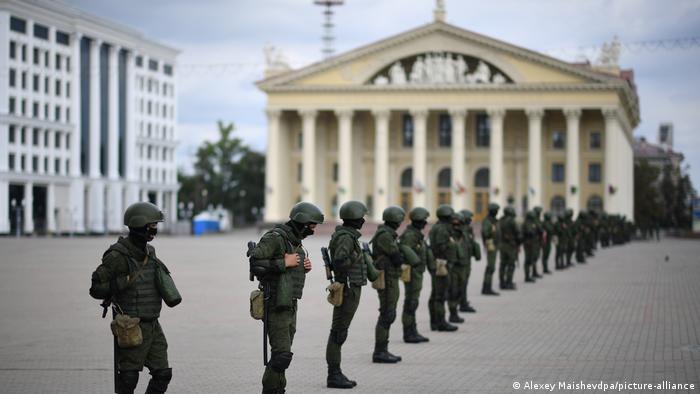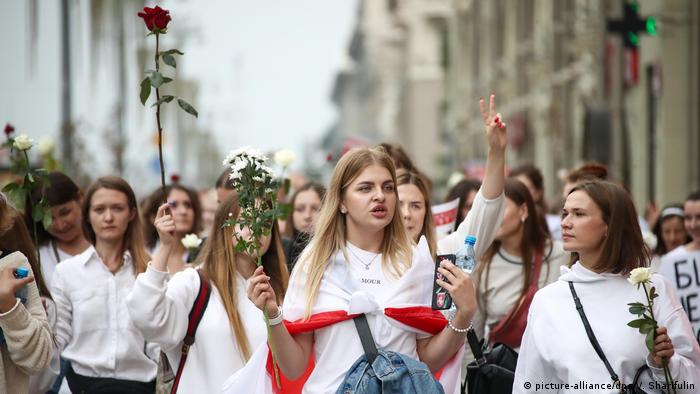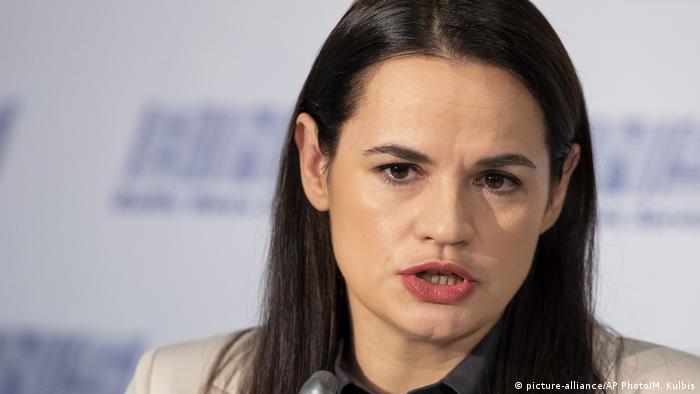Belarus president puts military on alert amid EU border tensions
Belarus says it has closed its border with EU countries. But Polish officials have described the action as just "another element of the propaganda campaign," saying the situation at the border hasn't changed.

Embattled Belarussian President Alexander Lukashenko on Thursday said troops would be pulled from the street to guard its borders with EU countries.
"We are compelled to withdraw our troops from the streets, have half our army on guard and close our state border with the West, first of all with Lithuania and Poland," said Lukashenko. "To our greatest regret, we are compelled to strengthen our border with brotherly Ukraine."
Polish officials said the situation had not yet changed at the border.
"We take this as another element of the propaganda campaign, a psychological game which aims to create a sense of an external threat," Polish Deputy Foreign Minister Pawel Jablonski told Reuters news agency.
Lithuanian border authorities also confirmed that the situation at the border with Belarus remained normal, saying they are waiting to see how the changes are implemented.
Read more: Opinion: Belarus opposition needs a plan
'Step down'
Since Lukashenko declared victory in a contentious presidential election last month, the former Soviet republic has seen thousands of protesters rally against his 26-year rule.
"Our people will not step away, they woke up and they want a new Belarus," former presidential candidate and opposition leader Svetlana Tikhanovskaya told DW last month. "The person who has to step down is Mr. Lukashenko."
Belarusian authorities have responded by cracking down on anti-government protesters and targeting opposition figures, including the leading opposition group, the Coordination Council, which has accused Lukashenko's regime of "openly using methods of terror.
Western countries have threatened to take disciplinary action against Belarus, including enacting targeted sanctions.
Read more: Belarus opposition leader threatened with deportation 'alive or in bits'
Watch video02:28
Putin pledges support to embattled Lukashenko
Internet blackouts
On Friday, nearly 30 countries issued a joint statement calling on Belarusian authorities to end internet blackouts, a tactic often used by repressive governments to stop the opposition from organizing.
"Shutdowns and blocking or filtering of services unjustifiably limit the rights of peaceful assembly and freedoms of association and expression, especially when they lack procedural fairness and transparency," said the statement.
Meanwhile, 17 members of the Organization for Security and Cooperation in Europe (OSCE) launched an investigation into rights violations in the wake of the contested August election, saying: "The mission is about holding the Belarussian authorities accountable."
Read more: Under threat from authorities, Belarusians go into exile

HOW FLOWER POWER CAN OVERTURN A SYSTEM
Flowers for a new Belarus
Reacting to the police's brutal crackdown on demonstrators following the contested reelection of longtime President Alexander Lukashenko, Belarusian women adopted powerful symbols of peace to pursue the protests. Dressed in white and bearing flowers, they marched and formed solidarity chains in the streets of Minsk, the country's capital. Flowers have often served as a revolutionary symbol. 12345678910
ls/sms (Reuters, dpa, AP)
DW RECOMMENDS
Putin pledges a $1.5 billion loan while meeting Lukashenko in Sochi
Russian President Vladimir Putin promised a massive loan to Belarus after welcoming embattled ally Alexandar Lukashenko in Sochi. The Belarusian strongman confirmed the two countries would continue joint military drills.
Date 17.09.2020
Related Subjects Poland, Alexander Lukashenko, Belarus
Keywords Belarus, Alexander Lukashenko, Poland, Lithuania
Permalink https://p.dw.com/p/3ieLx
Belarus says it has closed its border with EU countries. But Polish officials have described the action as just "another element of the propaganda campaign," saying the situation at the border hasn't changed.

Embattled Belarussian President Alexander Lukashenko on Thursday said troops would be pulled from the street to guard its borders with EU countries.
"We are compelled to withdraw our troops from the streets, have half our army on guard and close our state border with the West, first of all with Lithuania and Poland," said Lukashenko. "To our greatest regret, we are compelled to strengthen our border with brotherly Ukraine."
Polish officials said the situation had not yet changed at the border.
"We take this as another element of the propaganda campaign, a psychological game which aims to create a sense of an external threat," Polish Deputy Foreign Minister Pawel Jablonski told Reuters news agency.
Lithuanian border authorities also confirmed that the situation at the border with Belarus remained normal, saying they are waiting to see how the changes are implemented.
Read more: Opinion: Belarus opposition needs a plan
'Step down'
Since Lukashenko declared victory in a contentious presidential election last month, the former Soviet republic has seen thousands of protesters rally against his 26-year rule.
"Our people will not step away, they woke up and they want a new Belarus," former presidential candidate and opposition leader Svetlana Tikhanovskaya told DW last month. "The person who has to step down is Mr. Lukashenko."
Belarusian authorities have responded by cracking down on anti-government protesters and targeting opposition figures, including the leading opposition group, the Coordination Council, which has accused Lukashenko's regime of "openly using methods of terror.
Western countries have threatened to take disciplinary action against Belarus, including enacting targeted sanctions.
Read more: Belarus opposition leader threatened with deportation 'alive or in bits'
Watch video02:28
Putin pledges support to embattled Lukashenko
Internet blackouts
On Friday, nearly 30 countries issued a joint statement calling on Belarusian authorities to end internet blackouts, a tactic often used by repressive governments to stop the opposition from organizing.
"Shutdowns and blocking or filtering of services unjustifiably limit the rights of peaceful assembly and freedoms of association and expression, especially when they lack procedural fairness and transparency," said the statement.
Meanwhile, 17 members of the Organization for Security and Cooperation in Europe (OSCE) launched an investigation into rights violations in the wake of the contested August election, saying: "The mission is about holding the Belarussian authorities accountable."
Read more: Under threat from authorities, Belarusians go into exile

HOW FLOWER POWER CAN OVERTURN A SYSTEM
Flowers for a new Belarus
Reacting to the police's brutal crackdown on demonstrators following the contested reelection of longtime President Alexander Lukashenko, Belarusian women adopted powerful symbols of peace to pursue the protests. Dressed in white and bearing flowers, they marched and formed solidarity chains in the streets of Minsk, the country's capital. Flowers have often served as a revolutionary symbol. 12345678910
ls/sms (Reuters, dpa, AP)
DW RECOMMENDS
Putin pledges a $1.5 billion loan while meeting Lukashenko in Sochi
Russian President Vladimir Putin promised a massive loan to Belarus after welcoming embattled ally Alexandar Lukashenko in Sochi. The Belarusian strongman confirmed the two countries would continue joint military drills.
Date 17.09.2020
Related Subjects Poland, Alexander Lukashenko, Belarus
Keywords Belarus, Alexander Lukashenko, Poland, Lithuania
Permalink https://p.dw.com/p/3ieLx
OSCE to investigate human rights during Belarus election
Seventeen members of the OSCE have agreed to assign an independent team of investigators to probe election rigging and human rights abuses in Belarus stemming from August's ballot. They may not be able to go to Belarus.

More than a dozen members of the Organization for Security and Cooperation in Europe (OSCE) have launched an investigation into alleged human rights abuses and election fraud following Belarus' August presidential election.
The team will investigate reports of persecution of political candidates, journalists and activists. It will also look into the use of force against peaceful protesters, illegal detention and torture.
The mission is expected to publish a report within two months.
"Basically, the mission is about holding the Belarussian authorities accountable for their gross violations of the right of the people of Belarus to have free and fair elections, fundamental freedoms and a well-functioning rule of law," said Danish Foreign Minister Jeppe Kofod in a statement.
The team will travel to Belarus under an OSCE norm established in 1991 called the Moscow Mechanism, which "provides the option of sending missions of experts to assist participating States in the resolution of a particular question or problem," as the OSCE's website puts it. Seventeen OSCE members, not including Germany and mainly from northern and eastern Europe, triggered the investigation.
Belarusian President Alexander Lukashenko has claimed that he won his sixth term in office fairly and is the victim of a smear campaign.
The OSCE mission will likely not be able to access the country, as it prevented OSCE election observers from entering the country by not inviting them.
The eastern European nation has also ignored several offers by OSCE chairman, Albanian Prime Minister Edi Rama, to visit.
Belarusian opposition members said they were compiling a list of police officers implicated in an ongoing crackdown against protesters.

Opposition candidate Sviatlana Tsikhanouskaya left the country days after the election
"We have been given the names of those who have been torturing and beating people," said opposition leader Sviatlana Tsikhanouskaya through the opposition's Telegram channel. She left Belarus for EU member Lithuania soon after the election.
Read more: Belarus: High-profile opposition figures arrested in 'security' probe
Tsikhanouskaya came in second place in last month's election. Her supporters have claimed that the election was unfair.
Thousands of protesters have been detained since the election last month. The UN has received more than 400 reports of torture and abuse of detainees.
The European Union has refused to recognize the results of the presidential election.
The 57-nation OSCE predominately features European nations, including Russia, which has supported Lukashenko, albeit with more hesitance than in the past during the political crisis. Russia did not sign off on the investigation.
The United States, Canada and 15 European nations — not including Germany — supported the mission.
kbd/msh (dpa, Reuters)
Seventeen members of the OSCE have agreed to assign an independent team of investigators to probe election rigging and human rights abuses in Belarus stemming from August's ballot. They may not be able to go to Belarus.

More than a dozen members of the Organization for Security and Cooperation in Europe (OSCE) have launched an investigation into alleged human rights abuses and election fraud following Belarus' August presidential election.
The team will investigate reports of persecution of political candidates, journalists and activists. It will also look into the use of force against peaceful protesters, illegal detention and torture.
The mission is expected to publish a report within two months.
"Basically, the mission is about holding the Belarussian authorities accountable for their gross violations of the right of the people of Belarus to have free and fair elections, fundamental freedoms and a well-functioning rule of law," said Danish Foreign Minister Jeppe Kofod in a statement.
The team will travel to Belarus under an OSCE norm established in 1991 called the Moscow Mechanism, which "provides the option of sending missions of experts to assist participating States in the resolution of a particular question or problem," as the OSCE's website puts it. Seventeen OSCE members, not including Germany and mainly from northern and eastern Europe, triggered the investigation.
Belarusian President Alexander Lukashenko has claimed that he won his sixth term in office fairly and is the victim of a smear campaign.
The OSCE mission will likely not be able to access the country, as it prevented OSCE election observers from entering the country by not inviting them.
The eastern European nation has also ignored several offers by OSCE chairman, Albanian Prime Minister Edi Rama, to visit.
Belarusian opposition members said they were compiling a list of police officers implicated in an ongoing crackdown against protesters.

Opposition candidate Sviatlana Tsikhanouskaya left the country days after the election
"We have been given the names of those who have been torturing and beating people," said opposition leader Sviatlana Tsikhanouskaya through the opposition's Telegram channel. She left Belarus for EU member Lithuania soon after the election.
Read more: Belarus: High-profile opposition figures arrested in 'security' probe
Tsikhanouskaya came in second place in last month's election. Her supporters have claimed that the election was unfair.
Thousands of protesters have been detained since the election last month. The UN has received more than 400 reports of torture and abuse of detainees.
The European Union has refused to recognize the results of the presidential election.
The 57-nation OSCE predominately features European nations, including Russia, which has supported Lukashenko, albeit with more hesitance than in the past during the political crisis. Russia did not sign off on the investigation.
The United States, Canada and 15 European nations — not including Germany — supported the mission.
kbd/msh (dpa, Reuters)
No comments:
Post a Comment